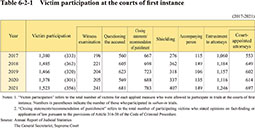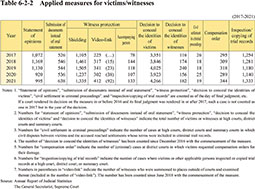Chapter 2 Victims in the Criminal Justice Process
Under the victim participation system, a court may allow a victim or others, by its ruling, to participate in proceedings of a case, to appear on trial dates, to state an opinion relating to procedural action by a prosecutor, to examine witnesses with regard to particulars relating to circumstances, to ask a defendant questions for the purpose of stating an opinion, and to state an opinion on fact-finding or application of law.
Table 6-2-1 shows the status of victim participation in trials at courts of first instance.
Table 6-2-1 Victim participation at the courts of first instance
Click here for the Excel file (Japanese)
Victims or others may express their feelings and opinions on the case in a public trial or submit written opinions in lieu of oral statements.
A court may take measures for witness protection in a trial, such as placing a shield in front of a witness, allowing a witness to stay in a separate room and communicate by video-link with a courtroom during his/her testimony, and/or allowing a witness to be accompanied by an appropriate person.
As another protective measure, a court, upon request, may render a ruling providing that names, addresses or other matters of victims, witnesses and others shall not be disclosed in an open court.
When a victim and an offender reached a civil settlement, it could become an enforceable title of obligation if terms of the settlement are included in a trial record of a criminal case. Additionally, a court hearing a criminal case concerning a specific serious offense may, upon request by a victim of a crime, continue with a civil case by referring to the record of the criminal case after the conviction and render a compensation order.
In addition, in general, courts allow victims to inspect and copy case records.
Table 6-2-2 shows the status of such measures taken for victims or witnesses.
Table 6-2-2 Applied measures for victims/witnesses

